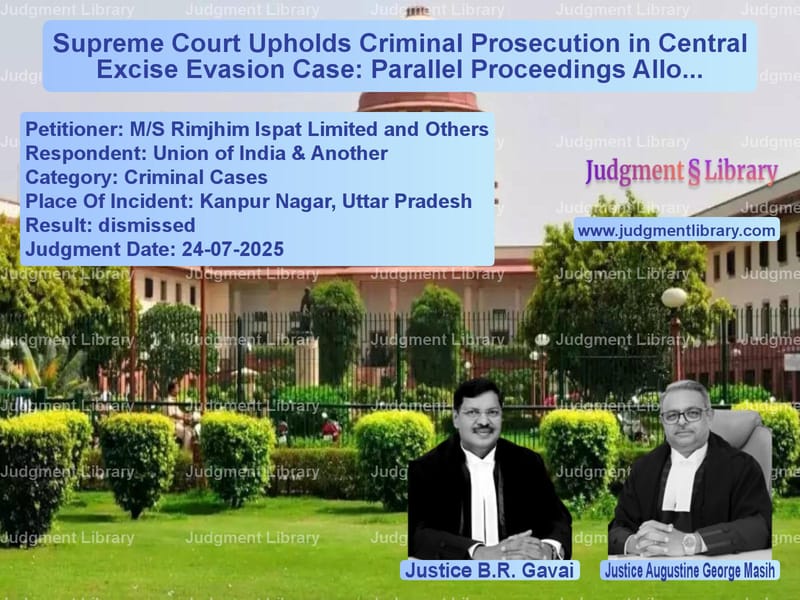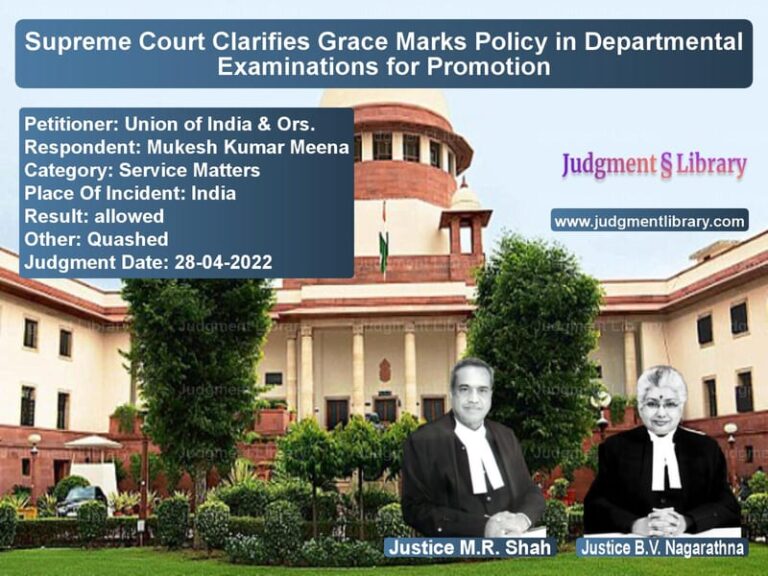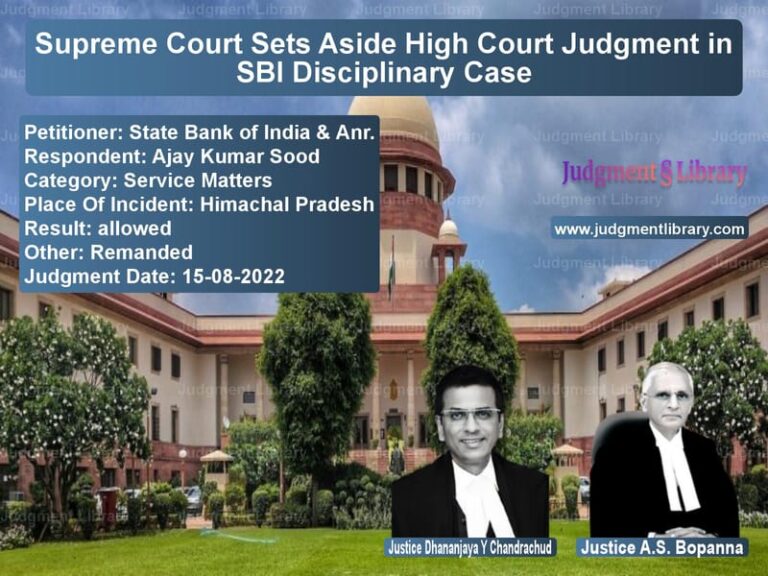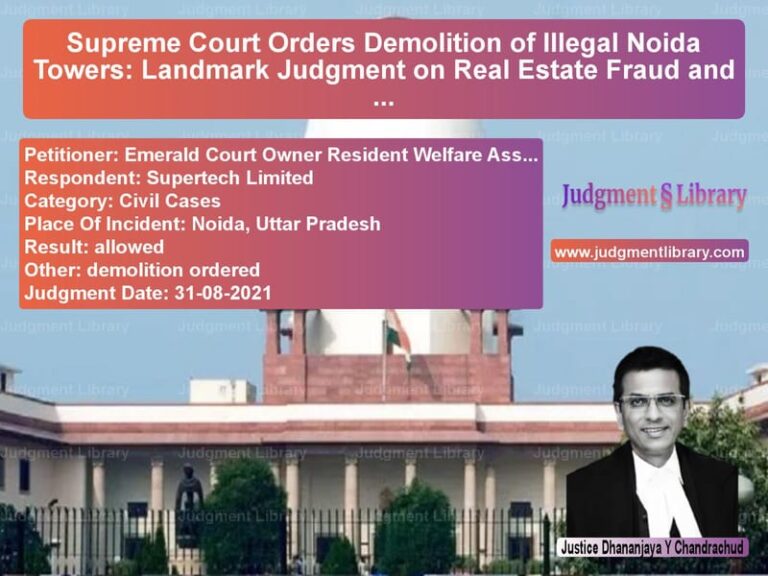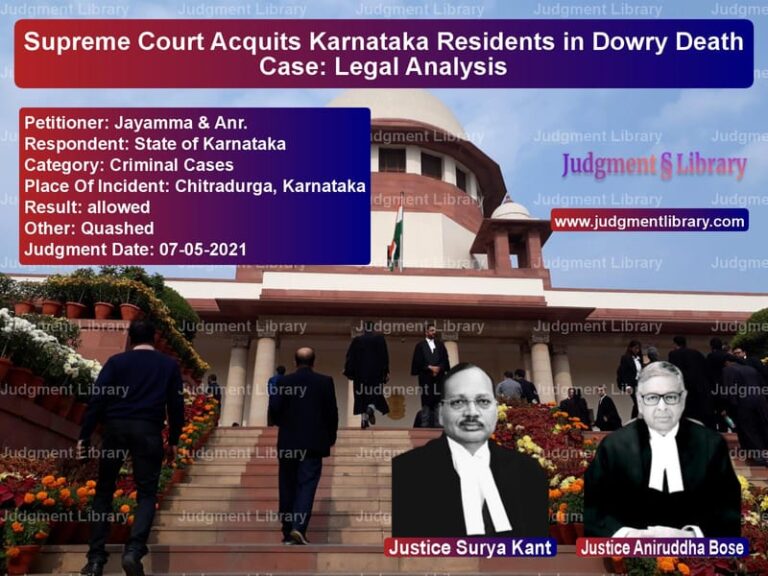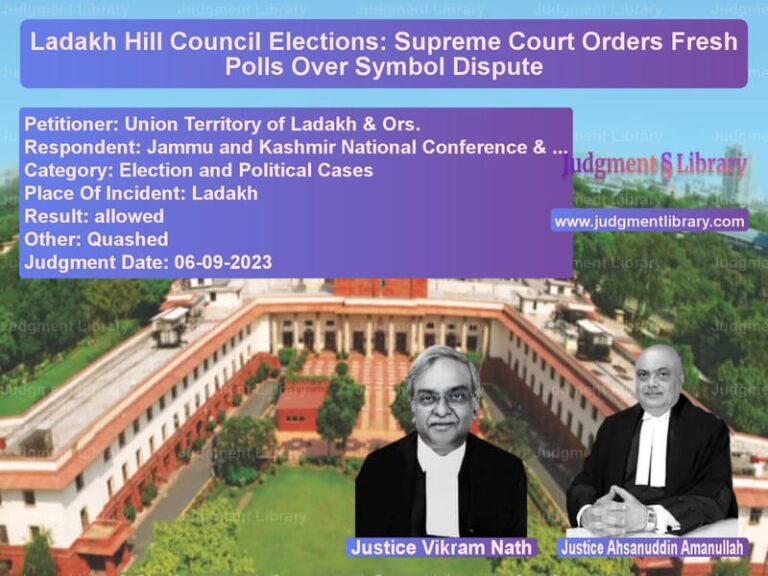Supreme Court Upholds Criminal Prosecution in Central Excise Evasion Case: Parallel Proceedings Allowed
In a significant judgment that clarifies the legal position regarding parallel departmental and criminal proceedings in tax evasion cases, the Supreme Court has dismissed an appeal by M/s Rimjhim Ispat Limited and others seeking discharge from criminal prosecution under the Central Excise Act, 1944. The judgment delivered on July 24, 2025, reinforces the principle that criminal proceedings can continue independently even when departmental proceedings face procedural setbacks, provided there is prima facie evidence of wrongdoing.
The case originated from a search conducted on November 22, 2007, at the premises, offices, and factories of M/s Rimjhim Ispat Limited, which unearthed serious irregularities leading to the initiation of proceedings through two separate Show Cause Notices. The first notice dated May 16, 2008, alleged clandestine manufacture and illicit removal of excisable goods, while the second notice dated March 6, 2009, attributed direct and vicarious liability to the directors of the company and M/s Juhi Alloys Limited for unlawful removal of excisable goods during the Financial Year 2006-07, along with evasion of excise duty, interest, and penal consequences.
The Legal Journey
The proceedings under the first Show Cause Notice were eventually dropped by the Additional Commissioner of Central Excise at Kanpur, and the seized goods were released. However, in relation to the second Show Cause Notice, the Commissioner of Central Excise at Kanpur upheld a substantial demand amounting to INR 6,68,94,028 along with interest against the appellants and imposed a penalty of INR 25,00,000 upon the third appellant under Section 11AC of the Central Excise Act, 1944.
The appellants sought relief before the Customs Excise and Service Tax Appellate Tribunal (CESTAT), which set aside the order on procedural grounds and remanded the matter for de novo consideration. The CESTAT observed that joint confirmation of duty against separate legal entities was impermissible and liability was required to be assessed individually.
Despite this procedural setback in departmental proceedings, criminal proceedings were initiated based on a Sanction Order dated May 3, 2013, by the Directorate General of Central Intelligence for prosecuting the appellants under Sections 9 and 9AA of the Central Excise Act, 1944. This led to the institution of Complaint Case No. 841 of 2014 before the Trial Court, and summons were issued against the appellants on May 2, 2014.
Arguments Before the Supreme Court
The learned Senior Advocate appearing for the appellants argued that “the basis of the Complaint was solely the sanction granted on the strength of the Order dated 31.03.2011, which had been set aside already, making it non-maintainable.” He further contended that “Even the Order dated 28.08.2015, which was passed behind the back of the Appellants, was also set aside with harsh observations against the Commissioner of Central Excise at Kanpur.”
The senior counsel also raised constitutional concerns, arguing that “there is a violation of Article 21 for dealing the instant case in contravention or violation of the procedure established by law.” He further asserted that “having lost the case before the CESTAT, the Respondent-Department had only acted in vindication against the Appellants and has not followed the principles of natural justice, which would render the act or proceedings a nullity.”
Attempting to distinguish the precedent in Radheyshyam Kejriwal case, the senior counsel submitted that “unlike in this case, the dispute involved in the said case was under the Foreign Exchange Regulations Act, 1973, which cannot be equated to CEA 1944.” He emphasized that “herein, the entire Complaint is based on a non-existent Order as it stood quashed by the High Court.”
On the other hand, the learned Additional Solicitor General appearing for the Union of India primarily placed reliance on the observations made in the decision of Radheyshyam Kejriwal case “to assert the legality of having parallel and continuation of adjudication proceedings and criminal proceedings against the Appellants.” Reference was also made to the decision in Air Customs Officer IGI, New Delhi v. Pramod Kumar Dhamija, wherein it was observed that “when exoneration in the adjudication proceedings was not based on merits or that the accused was not yet found to be innocent, the concerned High Court had committed an error in accepting the prayer for quashing of the proceedings.”
The ASG denied that the proceedings were vindictive and contended that “there is no independent basis for the Complainant, or there was suppression of facts by the Commissioner of Central Excise at Kanpur as contended by the Appellants.” He further contended that “there is no prescribed time limit for launching of prosecution.”
Supreme Court’s Analysis and Findings
The Supreme Court, after perusing the pleadings, materials and documents on record, including the Complaint, delivered a comprehensive judgment addressing all contentions raised by the appellants.
Regarding the appellants’ contention about reliance on a non-existent order, the court observed that “Considering the contentions of the Appellant on the aspect of reliance on a non-existent Order dated 31.03.2011, on it having been set aside, even assuming the said contention to be so, it is clear from the materials on record that investigation and the Complaint are still in sustenance against the Appellants.” The court further noted that “The contents of the Complaint reveal that there is no reliance placed on the now-set aside Order dated 31.03.2011 rather it was only referred as an addendum to complete the sequence of facts of the case of the Respondent-Department.”
The court emphasized that “The irregularities which came to light on search and the contents of the investigation report, are sufficient to observe and opine prima facie on the existence of allegations as mentioned in the complaint against the Appellants, at the time of the consideration made by the Trial Court justifying the passing of the summoning order.”
The Supreme Court made significant observations about the distinction between procedural setbacks and merits-based decisions: “However, a direction for de novo proceedings on technical or procedural grounds cannot be assumed to be in equivalence to having been set-aside on merits, when it was specifically mentioned that the merits have not been considered.”
The court extensively relied on the precedent set in Radheyshyam Kejriwal case, observing that “a reference to Radheyshyam Kejriwal (supra) reveals that, as in the present case, there is no bar on parallel proceedings, with one being by the Respondent-Department and the other being criminal in nature, under the CEA 1944.”
The judgment also referenced Videocon Industries Limited case, which “reiterated the merit of criminal proceedings when the orders on the civil side, proceedings by the Respondent-Department in the instant case, were passed on merits and not on technical foundation.”
Final Ruling and Legal Significance
In its conclusive findings, the Supreme Court stated: “We are in favour of the submissions made by the learned ASG and accordingly, are not inclined to interfere with the Impugned Judgment.” The court dismissed the criminal appeal and held that “the Impugned Judgment dated 05.02.2016 passed by the High Court of Judicature at Allahabad is good in law, calling for no interference by this Court.”
This judgment establishes several important legal principles. First, it reinforces that departmental proceedings and criminal proceedings can run parallelly and independently. Second, it clarifies that procedural setbacks in departmental proceedings do not automatically invalidate criminal proceedings if there is independent prima facie evidence. Third, it emphasizes that when adjudication orders are set aside on technical or procedural grounds rather than on merits, criminal proceedings can continue based on the original evidence.
The Supreme Court’s decision serves as an important precedent for tax evasion cases, balancing the rights of accused persons with the state’s responsibility to prosecute economic offenses. It underscores that technical procedural lapses in departmental proceedings should not become escape routes for those facing serious allegations of tax evasion and economic offenses.
The judgment also clarifies the scope of discharge applications in criminal proceedings, emphasizing that courts should examine whether the complaint prima facie makes out an offense under the statute, rather than getting into the merits of the case at the preliminary stage. This approach ensures that serious allegations are properly investigated and tried through the established legal process.
Petitioner Name: M/S Rimjhim Ispat Limited and Others.Respondent Name: Union of India & Another.Judgment By: Justice B.R. Gavai, Justice Augustine George Masih.Place Of Incident: Kanpur Nagar, Uttar Pradesh.Judgment Date: 24-07-2025.Result: dismissed.
Don’t miss out on the full details! Download the complete judgment in PDF format below and gain valuable insights instantly!
Download Judgment: ms-rimjhim-ispat-li-vs-union-of-india-&-ano-supreme-court-of-india-judgment-dated-24-07-2025.pdf
Directly Download Judgment: Directly download this Judgment
See all petitions in Fraud and Forgery
See all petitions in Tax Evasion Cases
See all petitions in Other Cases
See all petitions in Judgment by B R Gavai
See all petitions in Judgment by Augustine George Masih
See all petitions in dismissed
See all petitions in supreme court of India judgments July 2025
See all petitions in 2025 judgments
See all posts in Criminal Cases Category
See all allowed petitions in Criminal Cases Category
See all Dismissed petitions in Criminal Cases Category
See all partially allowed petitions in Criminal Cases Category

